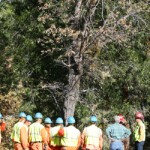
The Goldspotted oak borer, the non-native beetle that has killed more than 80,000 oaks in San Diego County, has been positively identified in an Idyllwild oak, on Highway 243 near the center of town. Currently, entomologists know of no native California predator or insecticidal defense against the tree killer.
A DNA analysis, conducted by the Invasive Species Lab at University of California, Riverside, confirmed the Idyllwild beetle has the same genetic characteristics as the GSOB invaders in San Diego County. Transportation in firewood from San Diego to Idyllwild is the likely culprit, according to forestry officials.
Until this identification, confirmed by CAL FIRE Battalion Chief Julie Hutchinson on Monday, Nov. 12, officials thought the beetle infestation had been confined to San Diego County, with the northernmost reach of this dangerous and highly invasive pest found just north of Julian.
In her press release, Hutchinson wrote, “This new detection of GSOB represents the first large scale movement of the beetle from its known area of infestation in San Diego County, 40 miles to the south. It is believed to have made the jump from San Diego to Idyllwild through the movement of infested firewood.”

CAL FIRE plans to remove the local infected tree on Wednesday, Nov. 14. A multi-agency rapid response team, including members from the U.S. Forest Service, CAL FIRE and University of California, Riverside, will conduct a local survey to determine if there are any other infected trees in the Idyllwild area.
“Leave firewood at home,” advised the CAL FIRE press release. “Do not transport it to recreational cabins, campground or parks. Buy it [firewood] where you burn it.”
Dr. Tom Scott, natural resource specialist at the University of California, Riverside, suggested it would be extremely beneficial if anyone who has imported wood from San Diego County to Idyllwild would share that information with the GSOB task force. The information would be helpful in determining when and specifically from where in the San Diego area the Idyllwild beetle came. This information may help tamp the spread of the deadly pest.
Scott said callers would face no penalties and would assist in what is now a fight to prevent further spread. Call (951) 827-2973 with your information.
Third District Supervisor Jeff Stone said that county Code Enforcement would be put on high alert to target roadside wood sellers in the Idyllwild area. There is a county ordinance (853) that prohibits roadside vending 40 feet from any public right of way, with certain limitations. “We’ll step up Code Enforcement and work with John Snyder, the county agricultural commissioner, to see how we can stop the spread,” Stone said. “If you see roadside wood vendors in the Idyllwild area, call my office (951) 698-7326. This is now an emergency.”
Because GSOB originated outside of California (northern Mexico and southeastern Arizona), there are no natural predators in California to check its progress. Authorities believe it hitchhiked into California in diseased firewood from either Mexico or Arizona.
A University of California, Davis, study estimates that as of February 2012, $8 million in public and private funds had been spent on GSOB mitigation efforts, including dead tree removal, infested wood disposal, closure of parks and campgrounds (due to hazardous dead trees), developing and supporting public outreach and education and engaging government agencies for response and assistance.
For locals seeking to be more actively involved in spotting and tracking GSOB spread, a field training will be offered from 9 a.m. until noon on Tuesday, Dec. 4, at Live Oak County Park, 2746 Reche Road in Fallbrook. Presenters include Dr. Tom Coleman, USDA Forest Service entomologist, Dr. Tom Scott, natural resource specialist, UCR, Kevin Turner, UCR GSOB coordinator and Pat Nolan, County of San Diego pathologist. There is no cost for the workshop. Register online at www.gsob.org or call Jan Gonzales (858) 614-7624. For more GSOB information, visit http://ucanr.edu/sites/gsobinfo/.












[…] suggest that everyone read Marshall Smith’s article on this subject in last week’s Town Crier and if you have already read it you might want to read it […]
They better do something fast. That 80,000 could easily climb into the hundreds of thousands before we know it if those bugs are left uncontrolled.